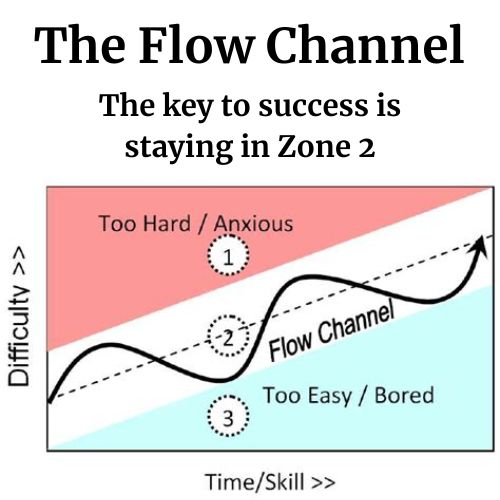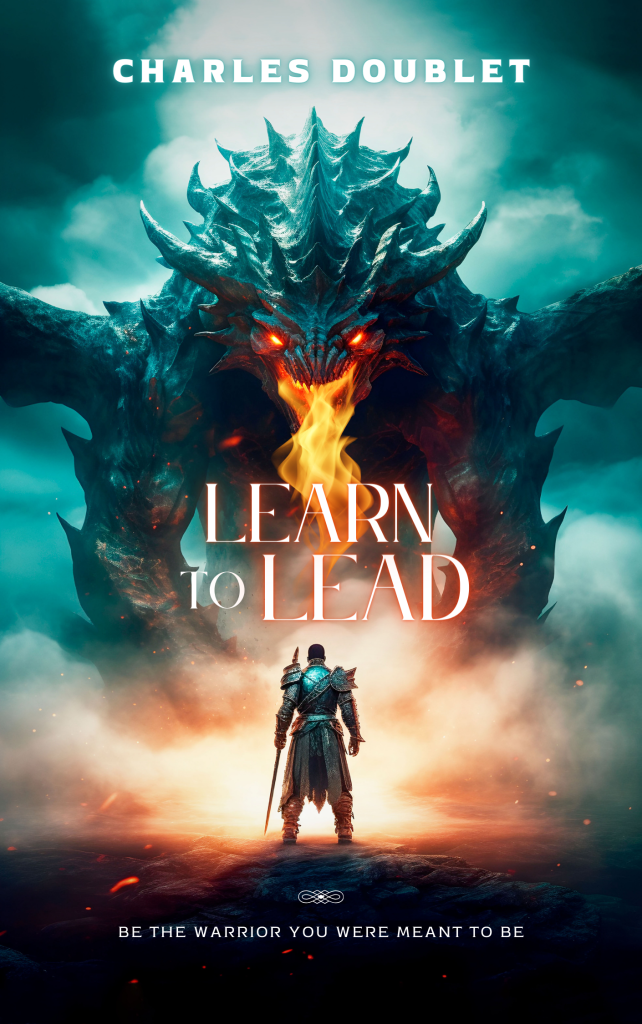6-minute read
Ready to break through plateaus and tap into a wellspring of success and happiness?
Then buckle up, warrior, because we’re diving into the Flow Channel, a martial arts-inspired approach to life built on the wisdom of the Shu Ha Ri training system.
Shu Ha Ri: It’s not just fancy kanji, kiddo.
It’s a roadmap to mastery.
Remember those frustrating early days in the dojo, memorizing basic blocks and kicks?
That’s Shu, mimicking the form.
Then came Ha, where you started to improvise, finding your rhythm.
And finally, Ri, where you transcend technique and flow in perfect harmony with the moment.
This same principle applies to everything in life, from writing killer Twitter threads to crushing that sales presentation.
If you’re ready to take your life to the next level, get my FREE 6-week Learn to Lead training program. Click here to get it.
How I Evolved from Loser to Leader with Shu Ha Ri
I’m not proud to say this, but when I was a kid, I was a complete loser and failure.
I barely graduated high school with a D+ average, finishing in the bottom 10 percentile of my class of 200 seniors.
To make matters worse, I wanted to join the military but was rejected from both the Navy and Air Force because of asthma.
As you can imagine, this didn’t help my self-confidence as a young adult.
I mean, even the military didn’t want me!
I was lost, angry, and frustrated.
Luckily, I had a mentor who, seeing my situation, gave me the life-changing opportunity I needed.
He introduced me to martial arts.
From martial arts training, I learned a more effective system of teaching, training, and skill acquisition than I did in school.
Martial arts taught me that I wasn’t a loser.
I was different and needed a tailored approach to learning and growing.
And the same is probably true for you.
In martial arts, I learned of the Shu Ha Ri model of training and how staying in your Flow Channel will maximize your growth.
In its simplest form, Shu Ha Ri is three stages of skill acquisition with very different mindsets and approaches.
And using the Flow Channel to get the most out of each stage.
First, let’s explore the Flow Channel…

In every activity that you engage in, there is always a meeting point for the difficulty of the activity in relation to your skills and expertise.
When it’s too hard, you easily become frustrated, overwhelmed, and sometimes even afraid.
On the other hand, when it’s too easy, you become bored, disengaged, and apathetic.
The key to the Flow Channel is learning to modulate and ratchet up or down the difficulty of your activity to match your skill and/or time window.
Even asking for help if needed.
The key to success with the Flow Channel is learning to stop and feel what is going on. Not plowing head-strong into the fray.
At any moment, you can pause and notice how you’re feeling.
Frustrated and anxious means you have too much on your plate, and it would be best if you evaluated everything you’ve got going on and focused on the most important, not necessarily the most urgent.
On the other hand, if you’re bored, it’s time to ratchet up your engagement, possibly taking on more responsibility or a more challenging assignment.
Now let’s see how the Flow Channel is applied to the learning process…
The Shu Ha Ri of Learning, Growing, and Evolving
Shu Stage
Shu is period of “hard skill” acquisition.
You copy your teachers and the masters, trying to duplicate what they do.
At this stage, you’re focusing on learning the rough framework, i.e., the mechanics, the muscle memory, and “what to do.”
It’s at this stage that Daniel Coyle, author of The Talent Code, says, “Work like a careful carpenter.”
“To develop reliable hard skills, you need to connect the right wires in your brain. In this, it helps to be careful, slow, and keenly attuned to errors. When you learn hard skills, be precise and measured. Go slowly. Make one simple move at a time, repeating it before you move on. Pay attention to errors, and fix them, particularly at the start.”
The Little Book of Talent, Daniel Coyle
You will know that you have developed your skill in the Shu Stage when an activity begins to “feel natural.”
You’re getting it; it’s starting to flow.
Looking at the Flow Channel, you will know it’s time to ratchet up the difficulty because you begin feeling bored in the activity you are learning.
Then you shift the focus of the skill from hard to soft…
Ha Stage
In the Ha stage, you begin to make the skill your own.
You no longer blindly copy your teachers, trying to mimic them as if you’re a puppet.
At this stage, you take what you’ve been given and adapt it specifically for yourself.
We’re all different and unique, and nothing works the same for everyone, so you need to learn how to make it work for yourself.
The key to developing soft skills is to apply the hard skills in ever-increasingly challenging situations.
As an example from martial arts, a beginner in karate learns a basic punch defense. At first, he practices the moves in a very static setting; the attacker stands in front of him, and at the teacher’s count, is attacked, and he can practice the defensive move.
Over time and with skill development, the student will practice the move in less structured and more intense situations.
At first, with controlled sparring drills, up to eventually fully dynamic and chaotic full sparring situations.
In the Ha Stage, Daniel Coyle recommends, “Play like a skateboarder.”
“… soft skills are built by playing and exploring inside challenging, ever-changing environments. These are places where you encounter different obstacles and respond to them over and over, building the network of sensitive wiring you need to read, recognize, and react.”
The Little Book of Talent, Daniel Coyle
All the while, noticing how he feels in relation to the Flow Channel to modulate the difficulty up or down as needed.
And finally, when it begins to flow freely, the student enters the Ri Stage…
Ri Stage
The Ri Stage is the point when the student begins to no longer think about what he’s doing; he’s flowing with the situation and adjusting automatically.
It’s the stage of “unconscious competence.”
At this stage, the student focuses on “letting go.”
Taking himself out of the equation, letting go of the ego and the attachment to the situation.
At this stage, you no longer “do” the technique or activity; you “are” the technique.
And again, you use the Flow Channel to assess at what difficulty level you are able to hold this stage.
This is where it becomes a life-long endeavor, continually challenging yourself to relax in increasingly difficult and intense situations.
Here’s how you can harness the Flow Channel and tap into your inner champion:
Shu: Mastering the Fundamentals:
- Sharpen your tools: Learn the essential skills for your arena. Whether it’s crafting captivating stories, wielding data like a samurai sword, or building landing pages that convert like Bruce Lee’s roundhouse kick, get good at the basics.
- Emulate the masters: Observe and learn from those who’ve gone before. Read interviews, dissect successful campaigns, and don’t be afraid to ask questions. Remember, even Miyagi-do began with waxing cars.
Ha: Breaking the Mold:
- Experiment and evolve: Don’t get stuck in rigid routines. Try new things, push your boundaries, and don’t be afraid to fail. Every missed punch in the dojo teaches you how to dodge the next one.
- Find your rhythm: What ignites your fire? What makes you lose track of time in a flurry of creation? Identify your flow triggers and cultivate them. For some, it’s deep-focus music; for others, it’s bouncing ideas off a trusted friend. Find what works for you.
Ri: Flowing Like Water:
- Let go of perfectionism: Striving for flawless execution can paralyze you. Embrace the “wabi-sabi” of life – the beauty in imperfection. Focus on progress, not perfection, and watch your energy flow like a mountain stream.
- Trust your instincts: You’ve trained, you’ve honed your skills, and now it’s time to listen to your gut. Learn to read the “ki” of the situation to anticipate and adapt in the moment.
Action Steps:

- Identify your flow triggers: What activities make you lose track of time and feel fully engaged? Schedule time for them each day.
- Practice “Shu Ha Ri” in a single project: Choose a goal and start by learning the basics, then experiment and iterate, finally letting go and trusting your instincts.
- Share your journey: Find a community or mentor to share your struggles and successes with. Remember, we rise together, like waves in the ocean.
Remember, warrior:
This is a journey, not a destination.
There will be ups and downs, but keep your focus on progress, not perfection.
Have fun!
When you’re enjoying the process, success and happiness naturally follow.
Unleash your Flow Channel, break through plateaus, and leave your mark on the world.
Leave a Reply